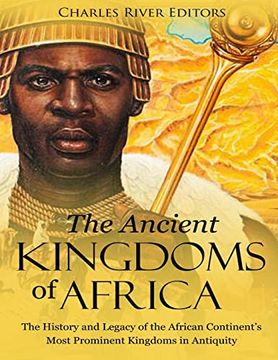The Ancient Kingdoms of Africa: The History and Legacy of the African Continent’S Most Prominent Kingdoms in Antiquity (en Inglés)
Reseña del libro "The Ancient Kingdoms of Africa: The History and Legacy of the African Continent’S Most Prominent Kingdoms in Antiquity (en Inglés)"
*Includes pictures*Includes ancient accounts*Includes online resources and a bibliography for further readingAfrica may have given rise to the first human beings, and Egypt probably gave rise to the first great civilizations, which continue to fascinate modern societies across the globe nearly 5,000 years later. From the Library and Lighthouse of Alexandria to the Great Pyramid at Giza, the Ancient Egyptians produced several wonders of the world, revolutionized architecture and construction, created some of the world's first systems of mathematics and medicine, and established language and art that spread across the known world. With world-famous leaders like King Tut and Cleopatra, it's no wonder that today's world has so many Egyptologists. Perhaps the most intriguing aspect of ancient Egyptian civilization was its inception from the ground up, as the ancient Egyptians had no prior civilization which they could use as a template. In fact, ancient Egypt itself became a template for the civilizations that followed. The Greeks and the Romans were so impressed with Egyptian culture that they often attributed many attributes of their own culture - usually erroneously - to the Egyptians. With that said, some minor elements of ancient Egyptian culture were, indeed, passed on to later civilizations. Egyptian statuary appears to have had an initial influence on the Greek version, and the ancient Egyptian language continued long after the pharaonic period in the form of the Coptic language. By the 4th century BCE, it appeared as though ancient Egypt was in its final death throes. It had long ceased to be an influential kingdom in the Near East and Mediterranean regions, and it had been ruled over by a succession of foreign peoples including Libyans, Nubians, Assyrians, and Persians. But just when Egypt seemed was doomed to pass forever into obscurity, it was reinvigorated by outsiders, most notably Alexander the Great. While in the process of campaigning to destroy the Achaemenid Persian Empire and conquer the world in 331 BCE, he made a pit stop in Egypt that forever changed the course of Egyptian history. Although his understanding of ancient Egyptian chronology and religion was minimal, Alexander was intrigued by ancient pharaonic culture, knowing, as the 5th century BCE Greek historian Herodotus once wrote, "Egypt is the gift of the Nile." As a result, Alexander endeavored to incorporate the land of the pharaohs into Hellenic Civilization. The three primary enemies of the Egyptians were the Libyans who occupied the Western Desert and its oases, the so-called Asiatics who lived in the Levant, and finally the Nubians to Egypt's south. Among the three peoples, the Nubians were the most "Egyptianized" and at times were integral to the development of Egyptian history. Truly, the Nubians were the greatest of all sub-Saharan peoples in pre-modern times and deserve to be studied in their own right, apart from ancient Egyptian history.In 1515, a Portuguese missionary explorer by the name of Father Francisco Álvares entered Ethiopia and took note in the interior of the remnants of a civilization of obviously Christian origin, with living adherents conforming to a branch of the faith clearly founded in antiquity. Could this be the Kingdom of Prester John? Father Álvares was intrigued, but he was wary of too fanciful a construction, and he speculated more practically on the legend of King Solomon, the Queen of Sheba, and other such muses. As for the city at the center of the civilization, he called it Aquasumo. Thus, the existence of the Kingdom of Aksum came to the notice of Christian Europe after almost 1,000 years of isolation. The Ancient Kingdoms of Africa: The History and Legacy of the African Continent's Most Prominent Kingdoms in Antiquity chronicles the tumultuous rise and fall of kingdoms like Egypt, Nubia, Aksum, and more.

